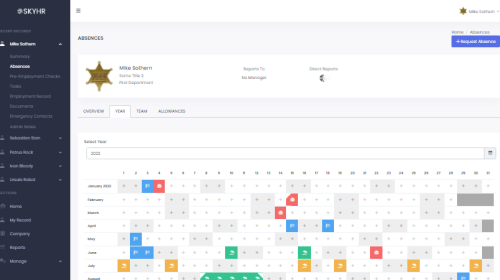For all businesses, managing employee absences has become more important than ever. Whether it’s due to illness, caregiving responsibilities, or personal reasons, unplanned absences can disrupt operations and impact productivity. That’s why many companies are turning to absence management software to help streamline processes and reduce administrative burden. In this article, we’ll discuss the benefits of absence management software in the workplace.
What Does Absence Management Software Do?
An absence management system is a software tool that helps companies manage employee absences, such as sick days, vacation time, and other time off. The software typically includes features such as:
- Absence tracking: The ability to track and monitor employee absences in real-time.
- Leave requests: A portal for employees to request time off and for managers to approve or deny requests.
- Reporting: The ability to generate reports on employee absences, including patterns and trends.
- Compliance: Tools to ensure compliance with employment laws and regulations related to absences.
Advantages of an Absence Management System
- Improved Productivity: By automating absence management processes, companies can reduce the time and resources spent on manual tracking and reporting. This frees up HR staff to focus on more strategic initiatives, such as employee engagement and retention.
- Cost Savings: Managing employee absences can be expensive, especially if companies have to pay overtime or hire temporary workers to cover shifts. An absence management system can help companies identify patterns of absenteeism and take proactive measures to reduce unplanned absences, which can ultimately save money.
- Compliance: Absence management software can help companies comply with laws and regulations by tracking employee absences and leave entitlements. This can be especially important for companies that operate in multiple jurisdictions or have complex leave policies.
Advantages of Monitoring Absenteeism
- Improved Employee Engagement: By monitoring absenteeism and taking steps to reduce unplanned absences, companies can create a more engaged workforce. Employees who feel supported and valued are more likely to be productive and committed to the company.
- Improved Customer Service: Unplanned absences can impact customer service, leading to delays and poor customer experiences. By managing employee absences more effectively, companies can ensure that they have enough staff to provide excellent customer service at all times.
Benefits of an Employee Management System
In addition to absence management software, many companies use employee management systems to streamline HR processes and manage employee data. Some benefits of employee management systems include:
- Centralised Employee Database: Employee management systems provide a centralised database for employee information, including personal and employment data. This can help HR staff access information quickly and easily, without having to sift through paper records.
- Compliance: Employee management systems can help companies comply with employment laws and regulations related to employee data, such as record-keeping requirements.
- Employee Self-Service: Many employee management systems include self-service portals that allow employees to update their own information, such as contact details and banking information. This can reduce the administrative burden on HR staff.
In conclusion, absence management software and employee management systems can provide many benefits to companies, including improved productivity, cost savings, and compliance with employment laws and regulations. By automating HR processes and providing a centralised database for employee information, companies can free up HR staff to focus on more strategic initiatives and create a more engaged and productive workforce.




